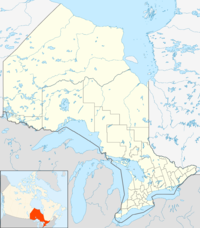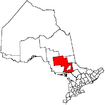Espanola, Ontario
| Espanola | |
|---|---|
| Town (single-tier) | |
| Town of Espanola | |
Spanish River and Domtar mill in Espanola
|
|
| Coordinates: Lua error in package.lua at line 80: module 'strict' not found. | |
| Country | |
| Province | |
| District | Sudbury |
| Settled | 1900s |
| Incorporated | 1958 |
| Government | |
| • Type | Town |
| • Mayor | Ron Piche |
| • MP | Carol Hughes (NDP) |
| • MPP | Michael Mantha (NDP) |
| Area[1] | |
| • Land | 82.44 km2 (31.83 sq mi) |
| Population (2011)[1] | |
| • Total | 5,364 |
| • Density | 65.1/km2 (169/sq mi) |
| Time zone | EST (UTC-5) |
| • Summer (DST) | EDT (UTC-4) |
| Postal code span | P5E |
| Area code(s) | 705 & 249 |
| Highways | Highway 6 |
| Website | www.espanola.ca/ |
Espanola (2011 census population 5,364) is a town in Northern Ontario, Canada, and is the seat of Sudbury District. It is situated on the Spanish River, approximately 70 kilometres west of downtown Sudbury, and just south of the junction of Highway 6 and Highway 17.
Contents
History
Origin
The name "Espanola" has been attributed to a story which dates back to the mid 18th century. The story goes that a First Nations Ojibwa tribe of the area sent a raiding party a long distance to the south and brought back with them a white woman who spoke Spanish. The Spanish woman married a local Annishnabeg (First Nations) of a family living near the mouth of the river and taught her children to speak Spanish. Later, when the French voyageurs and coureurs des bois came upon the settlement and heard fragments of Spanish spoken by the local natives, they remarked "Espagnole", which had been later anglicized to "Espanola", and the river was named the Spanish River.
Company town
Espanola was founded in the early 1900s as a company town for the employees of the Spanish River Pulp and Paper company, a subsidiary of the Mead Corporation, which opened a pulp and paper mill there. The town expanded quickly becoming a bustling company town with a hotel, school and theatre. On January 21, 1910, a Canadian Pacific Railway passenger train derailed off a trestle 10 km. east of Espanola. Forty-three people died from the railcar's 27-foot plunge into the icy water of the Spanish River. It was one of the CPR's worst railway accidents.
In 1927, Abitibi Power and Paper Company acquired the Spanish River Pulp and Paper Mills from Mead,[2] in a transaction that was subsequently seen to be highly overvalued[3] and having a conflict of interest that was ultimately detrimental to Abitibi’s shareholders.[2] Changing economic conditions brought on by the Great Depression forced the closure of the Spanish River facility in 1929.[4]
Espanola became a ghost town until the Second World War, when the mill site became a camp for German prisoners of war. During the final years of the Hepburn government, it sought to stimulate employment in Northern Ontario in order to stabilize its political position.[4] In that regard, it encouraged negotiations between Abitibi and Kalamazoo Vegetable Parchment Company of Parchment, Michigan which resulted in the sale of Abitibi's Spanish River facility (at that time its largest non-economic asset) in 1943.[4] It subsequently resumed operation as the KVP Company, producing specialty kraft paper.
In 1948, KVP was sued for nuisance in allowing noxious effluent to be discharged into the Spanish River, and an injunction was issued barring it from making any further discharge.[5] The order was appealed all the way to the Supreme Court of Canada without success.[6] In 1950, the injunction was dissolved by an Act of the provincial legislature, which provided for any subsequent disputes with KVP to be taken to arbitration,[7] which, together with other legislative changes,[8] effectively curtailed chances for any further injunctions to be issued. The 1950 Act was not repealed until 2006.[9]
The 1950 Act effectively gave KVP a limited licence to pollute, and serious cleanup efforts did not happen until the 1980s.[10]
In 1966 KVP was bought by Brown Forest Industries, a division of Charles Bluhdorn's industrial conglomerate Gulf and Western Industries. The Brown Forest Industries operation was later sold to E.B. Eddy, who operated the mill until June 1998. Now owned by Domtar, it continues to be the town's largest employer.
Espanola got some negative press in the early 1980s when the mill accidentally discharged toxic effluent into the Spanish River, killing fish by the thousands. The spill acted like a flush, and when the fish came back a few years later, they were reportedly untainted and thriving, although the toxic smell still remained. Now the mill is said to be one of the most stringent "zero-emissions" pulp bleaching processes in the world[citation needed], and the area below the Spanish River Dam is a designated fish sanctuary.
Recent history
Espanola was officially incorporated as a town on March 1, 1958.
The 1969 CBC Television series Adventures in Rainbow Country was filmed near Espanola, near the small First Nations community of Birch Island and at Whitefish Falls. The series starred Lois Maxwell, the actress who played "Miss Moneypenny" in Bond films such as Dr. No and Goldfinger. Canadian-born, she was a long-time resident of the town.
In 2001, a group of volunteers staged a fundraiser for the local hospital by attempting to set a world record for the world's longest ice hockey game. They were successful, playing for over three days straight. The record was broken in April 2004 in nearby Sudbury, where the teams played for six hours longer. Currently, the record holders are team Hope and team Cure from Sherwood Park near Edmonton, Alberta.[11] who have played for 10 days straight.
Demographics
Population trend:[12]
- Population in 2011: 5364 (2006 to 2011 population change: 0.9%)
- Population in 2006: 5314
- Population in 2001: 5449
- Population in 1996: 5454
- Population in 1991: 5527
Public services
Espanola's three primary schools, A.B. Ellis Public School, Sacred Heart School (Roman Catholic), and École St. Joseph (French Roman Catholic), and two secondary schools, Espanola High School and École secondaire catholique Franco-Ouest, service the local students, as well as those from surrounding communities such as Massey, Webbwood, McKerrow, Nairn Centre, Willisville, Whitefish Falls, Walford and Birch Island.
In 1999 a modern recreation complex was constructed, replacing the aging arena and community swimming pool. In addition, Espanola has a public library.
Media
Radio
- FM 94.1 - CKNR, variety
- FM 94.9 - CBON-7, Première Chaîne
- FM 99.3 - CJJM, variety
Other radio station signals are received out of Manitoulin Island, Elliot Lake and Sudbury.
Television
Former television stations which operated in the Espanola and area prior to the analog shutdown in 2012 which can only be received via cable or satellite:
- Channel 4: CBLFT-TV-7, SRC
- Channel 49: CICO-TV-71, TVOntario (Lee Valley)
One of the last operating analog television signals which can reach the Espanola area is CICI-TV (CTV) channel 5 out of Sudbury.
Espanola is home to the Mid-North Monitor, a weekly community newspaper.
Notable people
- NHLers/AHLers Art Gauthier, Leo Lamoureux and Al Secord.
- Former Canadian steeplechase record-holder Greg Duhaime was born here.
- Jim Gordon, a longtime mayor of Sudbury, lived in Espanola for a number of years in the 1960s and served on the town council before moving to Sudbury.
- Lois Maxwell, played Miss Moneypenny in the James Bond films and starred in Adventures in Rainbow Country.
See also
References
- ↑ 1.0 1.1 2011 Census Profile
- ↑ 2.0 2.1 Karn 2010, p. 4.
- ↑ Karn 2010, p. 5.
- ↑ 4.0 4.1 4.2 Boothman 1994, p. 30.
- ↑ McKie v. The K.V.P. Company Limited (and four other actions) 1948 CanLII 93, [1948] OR 398 (15 April 1948), Superior Court of Justice (Ontario, Canada), affirmed in K.V.P. Company Ltd. v. McKie et al. 1948 CanLII 14 (22 November 1948), Court of Appeal (Ontario, Canada)
- ↑ K.V.P. Co. Ltd. v. McKie et al. 1949 CanLII 8, [1949] SCR 698 (4 October 1949)
- ↑ The KVP Company Limited Act, 1950, S.O. 1950, c. 33
- ↑ The Lakes and Rivers Improvement Amendment Act, 1949, S.O. 1949, c. 48, s. 6
- ↑ Legislation Act, 2006, s. 98(3), as enacted by the Access to Justice Act, 2006, S.O. 2006, c. 21, Sch. F
- ↑ Lua error in package.lua at line 80: module 'strict' not found.
- ↑ http://www.worldslongestgame.com/Default.aspx?tabid=33
- ↑ Statistics Canada: 1996, 2001, 2006, 2011 census
Further reading
Bibliographies
- Lua error in package.lua at line 80: module 'strict' not found.
- Lua error in package.lua at line 80: module 'strict' not found.
- Lua error in package.lua at line 80: module 'strict' not found.
Economic history
- Lua error in package.lua at line 80: module 'strict' not found. (Section 14: Business History)
- Lua error in package.lua at line 80: module 'strict' not found.
External links
| Wikivoyage has a travel guide for [[Wikivoyage:Espanola (Ontario)#Lua error in Module:Wikidata at line 863: attempt to index field 'wikibase' (a nil value).|Espanola]]. |
 |
Baldwin | Nairn and Hyman |  |
|
| Sables-Spanish Rivers | Unorganized North Sudbury | |||
|
||||
| Unorganized North Sudbury |


